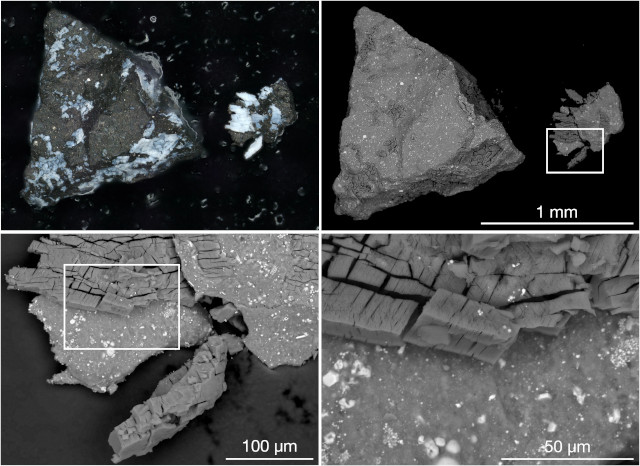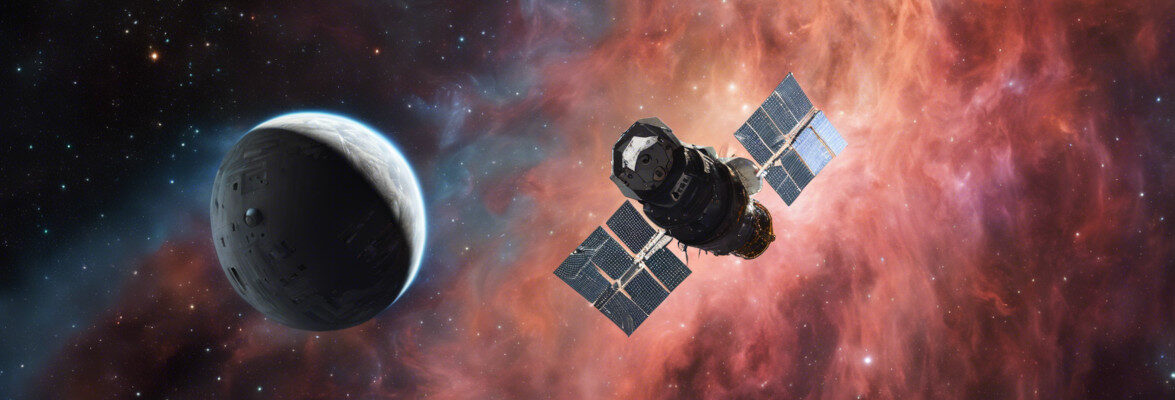
An article published in the journal “Meteoritics & Planetary Science” reports the results of the preliminary analysis of the samples of material from asteroid Bennu brought back to Earth by NASA’s OSIRIS-REx space probe. A team of researchers conducted morphological and chemical analyzes of the samples, finding a lot of carbon and nitrogen together with organic compounds, all very important components for life forms of the Earth’s type.
The image (Lauretta & Connolly et al. (2024) Meteoritics & Planetary Science) shows at the top left a sample taken from the asteroid Bennu and in the subsequent panels increasingly zoomed views of a fragment that broke off along a bright vein that contains phosphate, captured under an electron microscope.
The surprise came from the discovery of magnesium-sodium phosphate, which wasn’t detected by the instruments aboard OSIRIS-REx. This compound forms in water-rich environments and suggests that Bennu may be a fragment of a primordial world that had an ocean. The researchers mentioned Enceladus, Saturn’s moon with a subterranean ocean where sodium phosphate was found, and suggest a possible link to Bennu.
The rock type called serpentine was identified as the dominant rock type in the geology of asteroid Bennu. Understanding the conditions under which these rocks formed in the body from which Bennu derives is crucial to understanding its geological evolution. The researchers also found similarities between certain particles reported from Bennu and rocks that can be found in Guardavalle, Calabria, Italy.
On September 24, 2023, the OSIRIS-REx space probe parachuted to Earth the container with the samples taken from the asteroid Bennu during a mission that lasted almost exactly 7 years. All the necessary precautions have been taken to avoid any contamination because it’s essential to be sure that the compounds detected in the analyzes really come from Bennu.
7154 grains were counted in the samples analyzed in this study. Of them, 95% are larger than 0.5 millimeters, 34 grains are larger than 1 centimeter, and the largest is 3.5 centimeters. The counting isn’t finished because the number of grains, including the very small ones, is very high. This is useful among other things to understand if there were fragmentations during the collection of the samples and their journey.
Phosphates were also found in samples from asteroid Ryugu brought back by the Japanese space probe Hayabusa 2 but the magnesium-sodium phosphate found on Bennu has an unprecedented purity given that it doesn’t include other materials. Its formation suggests that Bennu was ejected from a primitive world with an ocean. It could be Enceladus or another moon of that type, but trying to understand it will require follow-up studies.
The fact that the magnesium-sodium phosphate and other compounds found in Bennu’s samples retained their original state is crucial to understanding what the early solar system was like. The presence of compounds important for Earth’s life forms on both Bennu and Ryugu could represent an important confirmation that asteroids also contributed to “seeding” the primordial Earth. For the moment we have samples taken from two asteroids and in both cases compounds important for the Earth-type life forms were found.
These very interesting results came from a preliminary analysis of samples from the asteroid Bennu. NASA will deliver samples to many laboratories around the world that will be able to conduct in-depth and independent analyzes of various types. All these studies will help reconstruct the history of Bennu and will contribute to reconstructing the early stages of the history of the solar system, including the birth of life.

